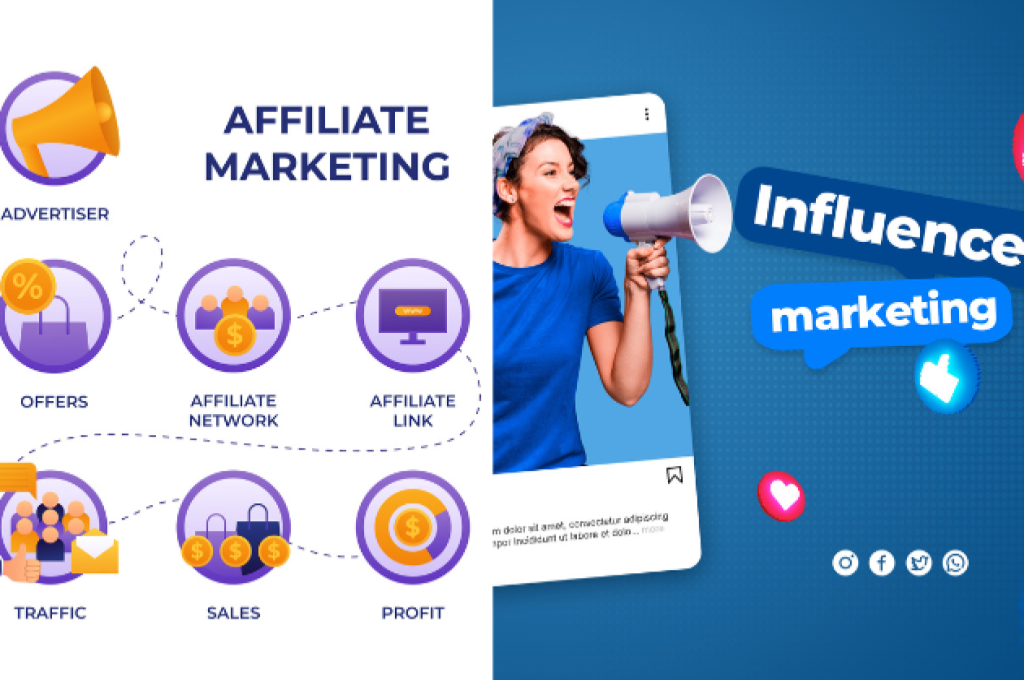
The world of digital marketing has been rapidly growing and evolving, with a wide prospect of companies seeking ways to promote their brand and products. Businesses are looking for effective ways to reach more audiences, increase sales, boost their brand, and enhance their online presence. Two methods often emerge in discussions – Affiliate Marketing vs Influencer Marketing.
Both strategies are part of digital marketing itself. However, they involve third-party promoters that operate differently and offer unique advantages. If you are not sure which method is most suitable for you, understanding the benefits of both will help you make an informed decision.
In this blog, let’s explore their meaning, benefits, key differences, advantages, and more.
What is Affiliate Marketing?
Affiliate Marketing is a performance-based marketing strategy wherein businesses collaborate with individuals(known as affiliates) to promote their products and services. In return, the affiliate gets a commission whenever a sale is made through their link. So, this is a win-win situation for both parties as the brands only pay for actual conversion, which makes it a cost-effective marketing strategy, and affiliates get the opportunity to earn and collab with big brands.
Affiliate Marketing is done through websites, influencer collaborations, website, email newsletters, social media, promotional links, and YouTube videos. This marketing strategy is widely used by e-commerce brands, software companies, and digital product sellers who want to drive sales.
Benefits of Affiliate Marketing
- Cost-Effective: One of the biggest benefits of affiliate marketing is that it is cost-effective since brands only pay for actual conversion to sales. Unlike traditional advertising, wherein you have to pay a certain amount but the ROI(Return on Investment) is not fixed.
- Wider Reach & SEO: Affiliates come from different industries and have their own set of audiences, so it is easy for brands to reach new and diverse audiences. Additionally, the content is created around the products, and affiliates provide links for sale, redirecting it to the brand’s website, which helps in optimizing search engines and increases ranks.
- Long-Term & Performance-Based Model: Affiliate content is visible for a long time on the platform, so it continues to generate traffic and sales. Since the brand only pays when a sale is made, it makes this strategy performance-based and minimizes the risk of investment.
What is Influencer Marketing?
Influencer Marketing involves brands working with content creators, celebrities, social media personalities, and bloggers who have a strong and loyal following. Instead of commissions, influencers are paid a fixed fee or receive free products from brands in exchange for promotions. This strategy has more of a collaborative approach.
Influencers Marketing is usually done on platforms like Instagram, Tik Tok, Facebook, Twitter, and YouTube. This marketing strategy is widely used by brands to reach wider audiences and create brand awareness.
Benefits of Influencer Marketing
- Strong Brand Awareness: One of the biggest benefits of Influencer Marketing is that it can create brand value quickly. Influencers have large audiences and play a key role in attracting potential customers.
- Engaging & Authentic Content: Influencers excel in storytelling and create content which is visually appealing and highly engaging, subtly promoting the product. This strategy helps in sustaining audiences’ interest and pitching them to try the product.
- Target Audiences & Boost Sales: Unlike traditional marketing, influencer marketing feels more personal and relatable due to the engaging content. When a brand launches new products, influencer marketing has the potential to create the required buzz and attract sales of not only the newly launched products but of the existing ones as well.
Affiliate Marketing VS Influencer Marketing
| Feature | Affiliate Marketing | Influencer Marketing |
| Goal | Its primary goal is to drive sales and have maximum conversions. | Its primary goal is to create brand awareness and engagement. |
| Platforms | Blogs, Websites, Emails, Youtube, Social Media. | Instagram, Tik Tok, Facebook, YouTube. |
| Content Type | Products or Services Reviews, Comparison, and SEO Content. | Social Media Reels, Live Videos, Youtube Shorts. |
| Payment Mode | Commission-based payment on every sale. | Fixed fee or free products. |
| Risk | Low risk since payment is done in the form of commision based on sales. | High risk due to upfront payment without a guarantee of sales. |
| Best for | It is best for direct sales. | It is best if you want to create brand trust. |
| Content Control | Brands have limited control since affiliates create independent content. | Brands have more control since it is a brand collaboration. |
Conclusion
Affiliate Marketing VS Influencer Marketing has its own unique traits and advantages. If your focus is to drive date with low risk, you can opt for Affiliate Marketing. However, if you’re goal is to create brand awareness and reach diverse and new audiences, you can opt for Influencer Marketing.
Ultimately, it depends on your brand’s goals, target audiences, and budget. Many brands opt for both strategies to reach their goals. You should seek professionals who have completed Digital Marketing or Influencer Marketing courses from institutes like IIEDM. IndividualS from such reputed institutes are highly professional and knowledgeble since courses are designed according to current trends and are taught by experts. They usually have hands-on experience as well due to the placement opportunities given to them during the course.





